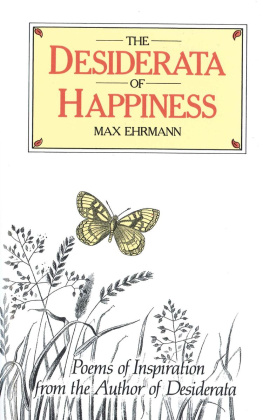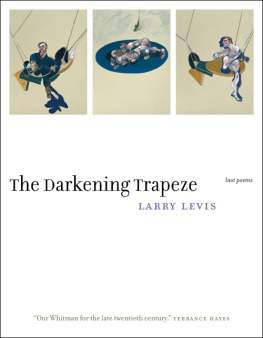You are a child of the universe, no less than the trees and the stars. You have a right to be here with all its sham, drudgery and broken dreams, it is still a beautiful world. Be cheerful. Strive to be happy. Those words from the worldfamous
Desiderata, written in 1927, represent the philosophy of Max Ehrmann, a poet largely unknown and unappreciated in his lifetime, whose fame came long after his death in 1945. Born into a comfortable German-American family, he graduated in English at De Pauw University and in Philosophy at Harvard; becoming a practising attorney in his home town of Terre Haute, Indiana, and then joining the family meat-packing and overall business.
At the age of 41 he left the company in order to devote his life to writing. Contemporaries told of him lying in the grass contemplating the skyan early flower child. Deeply concerned with social problems, he was a friend of Eugene Debs, the pioneer union founder in America, whose championing of the underdog struck a responsive chord in Ehrmann who deplored the exploitation of labour in his early twentieth century life. His poem America1910 reflects this period, and ComplacentWomen, written in 1918, is as relevant today as it was then. In his later years his maturity was recalled by Dean Grinnell of Indiana State College: He was a teacher without a classroom. Often he talked a little.
Sitting quietly, nodding, putting in a question, adding a fact, pulling together ends that appeared loose, he was the master. As he told an interviewer towards the end of his life: At De Pauw I contracted a disease which I have never shaken off. The disease was idealism. Because of it I did the thing in life I wanted to doWriting. He is surely one of the greatest spokesmen of the twentieth century. Robert L.
Bell
G o placidly amid the noise and the haste, and remember what peace there may be in silence.

As far as possible, without surrender, be on good terms with all persons. Speak your truth quietly and clearly; and listen to others, even to the dull and ignorant; they too have their story.

Avoid loud and aggressive persons; they are vexatious to the spirit.

If you compare yourself with others, you may become vain or bitter, for always there will be greater and lesser persons than yourself.

Enjoy your achievements as well as your plans.
Keep interested in your own career, however humble; it is a real possession in the changing fortunes of time.  Exercise caution in your business affairs, for the world is full of trickery. But let this not blind you to what virtue there is; many persons strive for high ideals, and everywhere life is full of heroism.
Exercise caution in your business affairs, for the world is full of trickery. But let this not blind you to what virtue there is; many persons strive for high ideals, and everywhere life is full of heroism.  Be yourself. Especially do not feign affection.
Be yourself. Especially do not feign affection.  Take kindly the counsel of the years, gracefully surrendering the things of youth.
Take kindly the counsel of the years, gracefully surrendering the things of youth.  Take kindly the counsel of the years, gracefully surrendering the things of youth.
Take kindly the counsel of the years, gracefully surrendering the things of youth.
Nurture strength of spirit to shield you in sudden misfortune. But do not distress yourself with dark imaginings. Many fears are born of fatigue and loneliness.  Beyond a wholesome discipline, be gentle with yourself.
Beyond a wholesome discipline, be gentle with yourself.  You are a child of the universe no less than the trees and the stars; you have a right to be here.
You are a child of the universe no less than the trees and the stars; you have a right to be here.  And whether or not it is clear to you, no doubt the universe is unfolding as it should.
And whether or not it is clear to you, no doubt the universe is unfolding as it should.
Therefore be at peace with God, whatever you conceive Him to be.  And whatever your labours and aspirations, in the noisy confusion of life, keep peace in your soul.
And whatever your labours and aspirations, in the noisy confusion of life, keep peace in your soul.  With all its sham, drudgery and broken dreams, it is still a beautiful world. Be cheerful. Strive to be happy.
With all its sham, drudgery and broken dreams, it is still a beautiful world. Be cheerful. Strive to be happy. 


Whatever else you do or forbear, impose upon yourself the task of happiness; and now and then abandon yourself to the joy of laughter.
And however much you condemn the evil in the world, remember that the world is not all evil; that somewhere children are at play, as you yourself in the old days; that women still find joy in the stalwart hearts of men; And that men, treading with restless feet their many paths, may yet find refuge from the storms of the world in the cheerful house of love.
To be with you this evening, rarest of the evenings all, And listen to the whispering leaves and to the night birds call The silvery moonlight on your face To be with you in some still place. To be with you somewhere within this evenings mystic shade, To hear your plans and hopes and tell you mine, all unafraid That youd forget to hold them dear, When Im away and youre not here. To be somewhere alone with you and watch the myriad stars, Far golden worlds beyond the noisy earths unkindly jars, As quietly they sail nights sea Above the world and you and me.
A clear, cool night. I have been reading, but the thoughts of man do not solace me.
I raised the curtain and looked at the moon, clear and silvery; and I brushed some of the unrest out of my mind. I know all the theories of the moon. There have been times when the symbols of science have robbed me of some of its mystery and charm. But no one can explain the moon any more than a grasshopper can explain me. In youth, the moon promised too much. But now I understand better; that was not the moons fault.
Also the moon and I have this in common: we both are wanderers across the night.
Let me do my work each day; and if the darkened hours of despair overcome me, may I not forget the strength that comforted me in the desolation of other times. May I still remember the bright hours that found me walking over the silent hills of my childhood, or dreaming on the margin of the quiet river, when a light glowed within me, and I promised my early God to have courage amid the tempests of the changing years. Spare me from bitterness and from the sharp passions of unguarded moments. May I not forget that poverty and riches are of the spirit. Though the world know me not, may my thoughts and actions be such as shall keep me friendly with myself.
Lift my eyes from the earth, and let me not forget the uses of the stars. Forbid that I should judge others lest I condemn myself. Let me not follow the clamour of the world, but walk calmly in my path. Give me a few friends who will love me for what I am; and keep ever burning before my vagrant steps the kindly light of hope. And though age and infirmity overtake me, and I come not within sight of the castle of my dreams, teach me still to be thankful for life, and for times olden memories that are good and sweet; and may the evenings twilight find me gentle still.











 As far as possible, without surrender, be on good terms with all persons. Speak your truth quietly and clearly; and listen to others, even to the dull and ignorant; they too have their story.
As far as possible, without surrender, be on good terms with all persons. Speak your truth quietly and clearly; and listen to others, even to the dull and ignorant; they too have their story. 